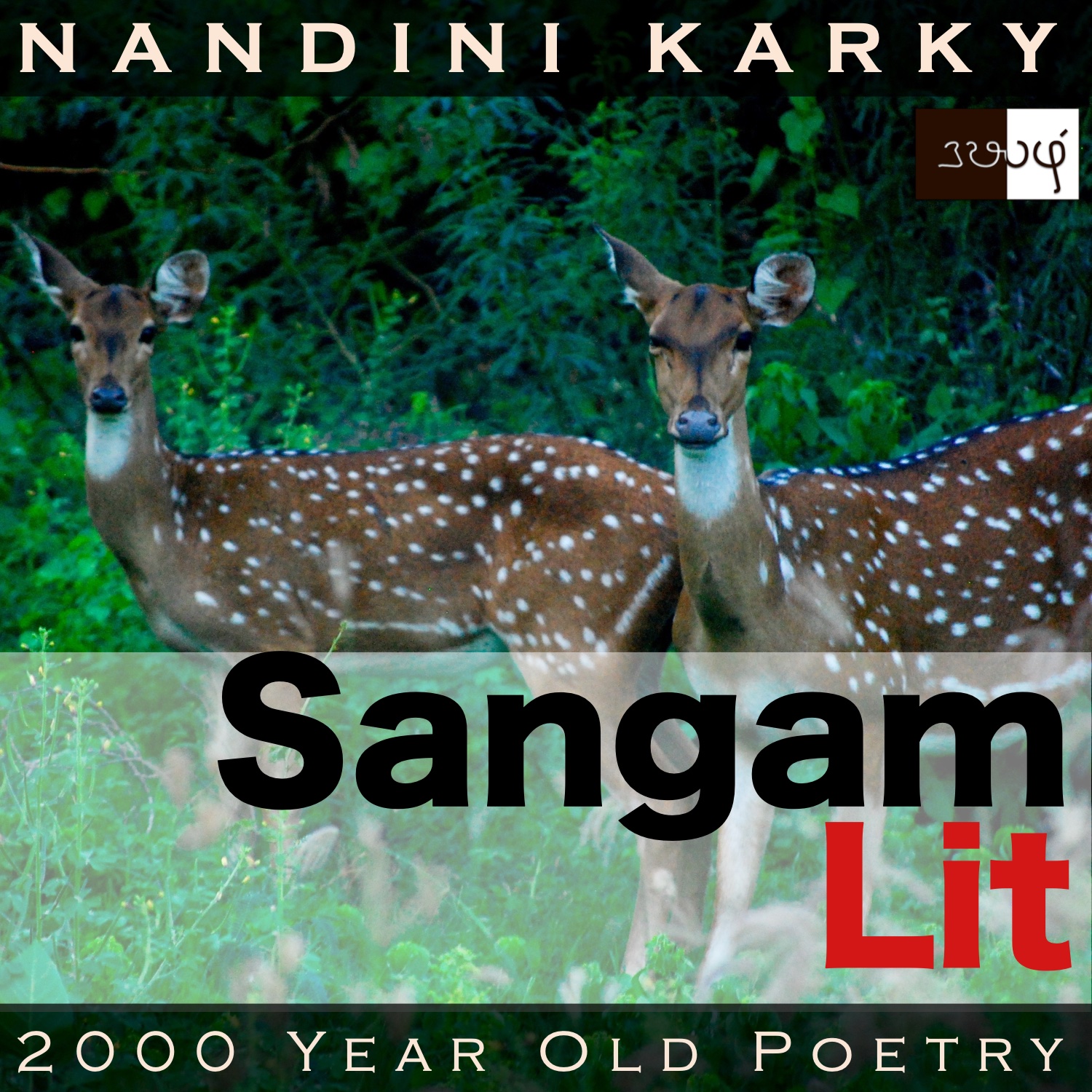Podcast: Play in new window | Download
Subscribe: Apple Podcasts | Spotify | Amazon Music | Android | iHeartRadio | Email | TuneIn | RSS | More

In this episode, we relish how scenes in nature propel a man towards his beloved, as portrayed in Sangam Literary work, Kurunthogai 250, penned by Naamalaar Makanaar Ilankannanaar. Set in the drylands of ‘Paalai’, the verse speaks in the voice of the man to his charioteer, urging him to rush homeward.
பரல் அவற் படு நீர் மாந்தி, துணையோடு,
இரலை நல் மான் நெறிமுதல் உகளும்
மாலை வாரா அளவை, கால் இயல்
கடு மாக் கடவுமதி-பாக!-நெடு நீர்ப்
பொரு கயல் முரணிய உண்கண்
தெரி தீம் கிளவி தெருமரல் உயவே.
‘Ride like the wind’ is the core concept here. The opening words ‘பரல் அவற் படு நீர்’ meaning ‘water above the spread of pebbles’ conjures up an idyllic image often seen in websites relating to meditation. Next, we look up in delight at ‘a handsome male deer’ meaning ‘இரலை நல் மான்’. The phrase ‘மாலை வாரா அளவை’ meaning ‘before the evening arrives’ marks the turning port in this rendition. In ‘கால் இயல் கடு மாக் கடவுமதி’, we glance at an alliteratively exquisite phrase filled with a sense of urgency, for it means ‘like the wind, hasten the speedy horses’. Another element of nature can be seen in ‘நெடு நீர்ப் பொரு கயல் முரணிய’ meaning ‘fighting fish in the deep waters’. Ending with the words ‘தெருமரல் உயவே’ meaning ‘to avoid sorrow’, the verse beckons us to listen intently.
Deer, horse and fish make this tiny verse flow with dynamism. The context reveals that the man and lady were leading a married life when the man parted away to gather wealth. After a long absence, the man completes his mission. At the start of his journey home, he turns to his charioteer and says, “Sipping water in the pond filled with pebbles, the fine male deer frolics along with its mate, near the drylands path during evening. Before such a time arrives, steer our speedy horses like the wind, O charioteer! My lady is one with kohl-streaked eyes, akin to battling fish in deep waters, and she speaks selected sweet words. Hurry, just so that she escapes a state of suffering!” With these words, the man requests his charioteer to take him home to the lady, before evening could attack her.
A situation we have often encountered, where we have relished how the man requests instead of commanding his charioteer. Let’s explore the nuances in this version. The man starts by pointing to a pond filled with many pebbles. That he can see the pebbles indicates its crystal clear water flowing above. Then, he points his camera at a dashing male deer, which slurps up this cool water, and then moves towards its mate, to hop around and delight together in its company. Why has the man shown us this scene which brings an irrepressible smile to the face? Only to say that this joyous union happens in the evening time and connects this to what he wants to say to his charioteer by telling him that before this evening comes, their fast horses must be hastened like the wind. Note how speed is stressed in first calling the horses so, and even though they are already speedy, they must be made to run like the wind, the man insists!
To answer the why in the charioteer’s mind and ours too, the man talks about his lady love. He describes her as having kohl-streaked eyes that look as if two fish in the deep waters are battling. What a stunning image to evoke the beauty of a woman’s eyes! The next stroke in the portrait of the lady is even more delicious for he says she’s one who speaks such well-chosen words of sweetness. As the man says these words to his charioteer, we can sense that he sees the lady’s eyes and hears her voice in his mind. After that description of the lady, the man tells his charioteer that he must race like the wind, so that the lady escapes anxiety and angst. To understand why the lady would go through those emotions, we have to recollect how the evening is mentioned as a time of torment for the separated. That’s why the man urges his charioteer to transport him home to the lady before dusk descends. Although he projects his request as if only to allay the lady’s disturbed feelings, we can understand that when he saw that deer and mate along the way, the man too must have started missing his beloved dearly and that’s the implied reason for that rush to go home.
A verse that exquisitely captures the feelings of a person reuniting with their beloved after a long absence. As I read and reflected on this verse, images of men and women embracing near ships and trains at the end of the two World Wars pop up. It also brings up other recent sights at airports that I have seen, such as the embrace and kiss of the returning. A blessing indeed to find arms waiting for one to come home to!




Share your thoughts...